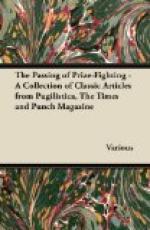* * * * *
“The dispute, he claimed,
was not started by the employees, but by
the employer making sweeping
reductions in the ages of the men.”
Daily Paper.
If he wants to do this sort of thing with impunity he should employ women.
* * * * *
A FOOD PROBLEM.
DEAR MR. PUNCH,—Please do tell me. Must I count sausages under the meat or the bread allowance? I do so want to help my country faithfully.
Yours,
WORRIED HOUSEWIFE.
* * * * *
“REWARD 2s. 6d.
Lost, a small Silver Toothpick, value
sentimental.”
Nottingham Evening Post.
The latest thing in love-tokens.
* * * * *
“After a debate lasting
three days, the Senate rejected the motion
approving Mr. Wilson’s
Nose.”—The Bulletin (Lahore).
The Senate has since shown its impartiality by registering its profound disapproval of the KAISER’S Cheek.
* * * * *
“A special constable has received the Silver Medal of the Society for Protection of Life from fire for his gallantry in mounting a ladder at a local fire last May and rescuing a cook.”—Daily Paper.
It is understood that members of the regular “force” consider that he showed some presumption in not leaving this particular task to them.
* * * * *
[Illustration: BLIGHTED PROSPECTS.
BERNSTORFF (bitterly). “PRETTY MESS
YOU’VE MADE OF IT WITH YOUR NEW
FRIGHTFULNESS. I’VE LOST MY JOB!”
HINDENBURG (also bitterly). “WELL, YOU’RE WELCOME TO MINE.”]
* * * * *
[Illustration: Dug-out (who has been put off on the last three greens by his caddie sneezing, and has now foozled his putt again). “CONFOUND YOU! WHY DIDN’T YOU SNEEZE? I WAS COUNTING ON IT.”]
* * * * *
ESSENCE OF PARLIAMENT.
Wednesday, February 7th.—HIS MAJESTY opened Parliament to-day for what we all hope will be the Victory Session. But it will not be victory without effort. That was the burden of nearly all the speeches made to-day, from the KING’S downwards. HIS MAJESTY, who had left his crown and robes behind, wore the workmanlike uniform of an Admiral of the Fleet; and the Peers had forgone their scarlet and ermine in favour of khaki and sable. When Lord STANHOPE, who moved the Address, ventured, in the course of an oration otherwise sufficiently sedate, to remark that “the great crisis of the War had passed,” Lord CURZON was swift to rebuke this deviation into cheerfulness. On the contrary, he declared, we were now approaching “the supreme and terrible climax of the War.”




